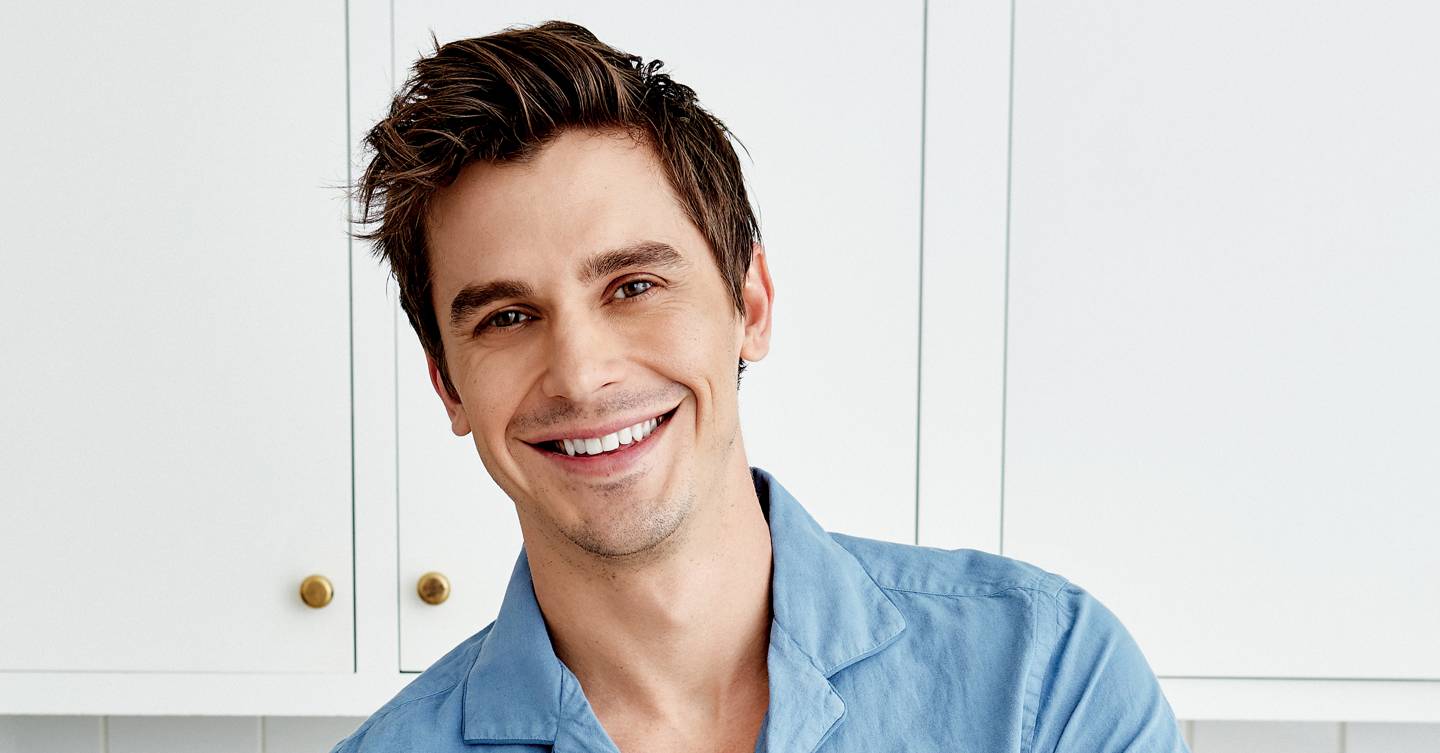In just over a year Antoni Porowski has catapulted from working in an art Gallery in New York city to being an international Netflix star as Queer Eye’s resident food and wine expert. Overnight fame doesn’t come much more drastic than this – but his meteoric rise came after years of acting auditions and moments of serious self-doubt.
WATCH: Antoni opens up about how relationships with men changed his perception of body image and the lessons he has learnt from therapy
Now with four seasons of Queer Eye under his belt – and an upcoming special in Japan no less – and 4.1 million thirsty Instagram followers the Canadian is releasing his cookbook the aptly named, Antoni in The Kitchen. And the success continues, as it’s already number two on the New York Times Best Seller list. Long may the King of avocadosreign over us!
Here, in the latest episode of GLAMOUR Unfiltered, Antoni joins our resident host, Josh Smith, to discuss his relationship with body image, the lessons he has learnt from therapy and how he over-came a ‘shame ‘over his Polish roots…
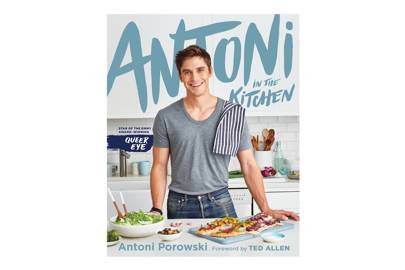
How did you feel when you found out it was a number 2 bestseller in NY times?
I had an emotional mini meltdown. I called my father immediately who was in Italy and I’m pretty sure he was drunk on his biking trip. I was like, ‘Dad, I made it on the NY times bestseller list!’ He was like, ‘your cookbook’s out?’ I Just said, ‘Jesus Christ, Dad!’ I remember when I first got the book in the mail and opening it up and seeing months and months of work all come together in one big piece. It’s scary but also exciting. Apparently fear and excitement is the same neurotransmitter response so whenever I’m scared, I tell myself I’m excited!
Do cooking and food go hand in hand with your self-care regimes?
Absolutely, now more than ever. The biggest luxury for me now is being in my own apartment, sleeping in my own bed, cooking in my own kitchen. That’s the irony of my life now, I cook a lot less than I used to. I used to do it five days a week, now it’s like once a month. Anything that I can refer to as coming down from the mania of a day of filming or promoting the book, connecting to myself with food and focusing on one thing is probably the best thing I can do for myself.
Your relationship with food goes hand in hand with the one with your family hasn’t it?
Absolutely. My dad and I are both very obsessive about food. We can be eating one meal and talking about the next. When we travel, the first thing we do is go to a grocery store. All I’ve wanted to do since landing here is go to a grocery store and look at pantry staples. Whenever my parents would travel when I was a kid, they would always come back with recipes rather than gifts and we’d cook. We didn’t always get along but when we were sat around a table enjoying a meal together, that was the one time we were all able to break bread and have some laughs.
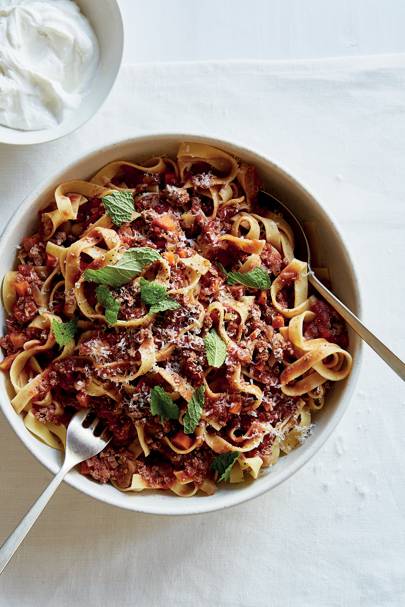
Food is like therapy for you isn’t it?
Totally. You’re feeding yourself or you’re making something out of nothing for other people. There’s a lot of symbolism and good positive messaging in there.
The last year has been absolute insanity for you. How did you cope with ‘overnight success’?
It hasn’t been normal. I’m still trying to adjust. I only started meditating a few weeks ago and that was something I hadn’t done for years that a lot of friends suggested I do. If I walk into a room and I see someone who is sad or upset, I take on their feelings and keep them. If I get sad, I stay sad a lot longer than I need to. Same with happiness. So, meditation for 10 or 15 minutes is a good way of setting myself up in the morning/ Headspace is a great app as it allows the feelings to come and then I let go of them and don’t have to hold onto them so much. Everything is changing at such a quick pace. There’s always another thing on the horizon and it’s gets challenging sometimes. I really want to appreciate and embrace every moment but it’s hard. Meditation allows me to do that and accept the fact that if I wake up and feel 60%, I’m going to 100% of that 60%. I don’t have to try and compensate or feel a certain way. It’s all about acceptance.
Queer Eye is all about acceptance, too…
We have to practice what we preach. I don’t go in there preaching. I try and see our hero’s wherever they’re at but if we’re promoting self-care, it’s got to be something we practice.
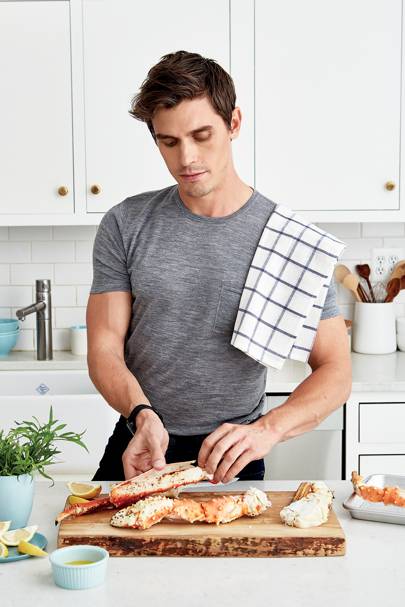
What’s your journey with your own self-acceptance been like?
The first thing that comes to mind is my Polish heritage. That was a trickier one. It felt normal to be Polish growing up and then I moved to West Virginia where diversity was not really a thing. I was raised in Montreal, which was super multicultural, a lot like London, and then when I moved to West Virginia, it was very different. We didn’t really have that and then suddenly people were asking about my name, why was it so weird, why did I speak three languages, why was I bringing a lot of cabbage into school for lunch? The things that I took for granted, I felt embarrassed about it so I pushed it away for a while, even to the point of I almost fully forgot Polish in the three years I was there. A lot of it was self-imposed. My parents sent me back to Montreal to a French boarding school, started working in a Polish restaurant. At that age when I was in my late teens, early twenties I realised it was cool. It’s been a river of love/hate and now I’m showcasing Polish recipes – and hangover cures – in my cookbook and it’s something I’m really proud of it. It’s part of me so I might as well accept it and the part after accepting it is embracing it and honouring where I come from.
It’s a very strange thing to suddenly feel embarrassed about something you never paid attention to. That happens to a lot of us when we’re really young running around naked at your parents’ house and then you grow up and suddenly nudity isn’t a thing and you realise we have to wear clothes. It’s a layer of that. You get socialised into being embarrassed about things you shouldn’t be embarrassed about. For some people, that’s body images, sexuality, heritage but I think it was tough. My only reaction was to squash it and try be like everyone else.
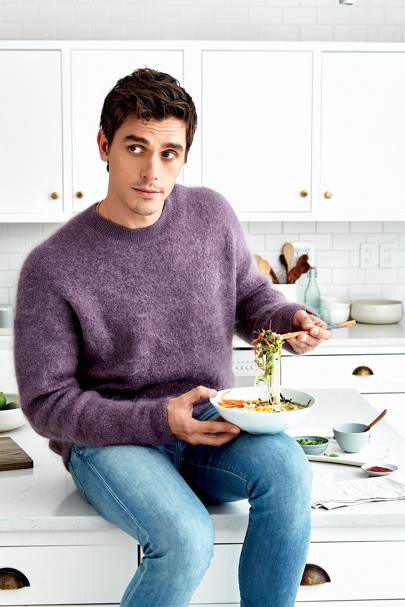
When did you start to accept yourself?
When I met people in my community who I could identify with. I started university in Montreal, worked at a Polish restaurant with people who had weird ass polish names and it was like oh there’s lots of us and it’s pretty cool. It’s about attaching yourself to a tribe of people with like-minded interests. I hear a lot about that in the LGBTQ+ community as well, especially in the US. We have something called GSA (gay straight alliance) and kids feel a lot less lonely when they find people are like them, so they don’t feel like they’re the only one going through what they’re going through. When you feel alone, that’s a terrifying thing but when you see there’s other people like you, it makes it easier to have a conversation and get ideas out of your own brain and let those words come out.
Do you think sexuality made that harder for you to accept yourself?
If I’m fully honest, part of me always knew that I was interested in guys but at the same time I had relationships with women where I was really happy. I was in love with women. I knew it was a case of when I find the one, I’ll know. That happened in my early-mid 20s and before that I was really content dating women. I speak to a lot of gay guys who talk about having a ‘beard’ (fake girlfriend) in high school and that was not something I ever really understood. Being bullied for being gay or being called the ‘f word’ wasn’t something I experienced because it was assumed that I was straight. Even when I was in a long-term relationship with a guy, I worked at a restaurant and everyone assumed I was straight until he came in one day. ‘I’m surprised but not shocked,’ was usually the reaction. What made it more complicated was the fact I didn’t feel comfortable identifying as a certain title.
While I was embarrassed by my Polish heritage, I liked that I was different because I do have a rebellious nature and the fact, I didn’t belong fitted with that. It’s the idea of if you don’t belong to a certain group, they don’t have control over you, and you can free to do whatever you want. I always read weird books, I listen to strange music, I was into the darkest Jonny Cash at 12 years old. My interests were always different. With relationships, it was the same thing. I liked the fact that people would question and not be sure who I was into. When it came down to it, I knew I didn’t want to be considered bisexual or gay or heterosexual. It still doesn’t sit well with me. For people who want to identify, I’m all for it but for me personally, the closest thing is queer or fluid if we have to give it a name. Whatever makes people comfortable. Live and let live.
Last time we spoke you opened up about going to therapy. What lessons have you learnt from talking about your experience?
With any problem, when the conversation is with yourself, you create your own dialogue about it and often, especially in therapy, when I share things with someone else who has an empathetic ear and is non-judgmental I realise things aren’t as precious. Or if I have a thought and share it with my therapist and she’ll be like, ‘oh yeah this is actually a common thing for guys your age to experience this!’ And suddenly it’s like, ‘Oh loads of people talk about this!’ You realise you’re not alone which is nice and humbling. In early twenties, I always thought I was the only person to experience what it was like to have a family torn and a child of divorce and being fluid. When you start speaking to people, you realise everyone has their stuff they go through. The experiences can be different, but we all experience the same feelings.
People are VERY thirsty for your topless photos but what’s your own relationship with body imagelike?
I was most comfortable with my body when I was in a relationship with women. There wasn’t a sense of comparison because we were different. It was my first relationship with a guy where I looked at myself and I was like, ‘oh my biceps aren’t as big as his, I wish my legs were longer, I wish my torso was longer.’ I got really self-conscious and it was the comparison. I’m hard on myself about my body. I do love to eat and it’s not something I stop because I do enjoy it so much that I’m not going to starve myself. I think about it a lot. Since the show came out, I have seriously cut down on dairy. That’s changed my body a lot. I’m somebody who loves cheese but also when you’re on camera all the time, you see yourself at an angle and you can drive yourself crazy sometimes. I’m also really hyper and I’ve been very active. I have days when I wake up, feel like human garbage and eat plant based and go to the gym twice a day and then I have days where I feel really good about myself and destroy two burgers in a day with a pizza and a milkshake and maybe have a chocolate bar. I have two sides of me and that goes with anything.
I feel the same! As a gay man I constantly compare my body to the men I am with…
You shouldn’t have to. Women and men have all kinds of societal pressures. Sometimes they’re self-imposed and the idea of perfection – whatever the hell that is! Instagram, you see what you see but it’s an opportunity to really lean in and practice self-love. Self-love can also be taking care of someone else as well. That’s a trick these days. All these people talk about self-care but it’s also equally, if not more important to be of service to someone else. You feel good if you take care of someone.
You said to me before the episode with Mamma Tammye was the hardest episode for you to film. Why did that story resonate with you so much?
That was an emotional week. It was five months that we were living in Atlanta. Sometimes you can get completely emotional about something that has nothing to do with what you’re doing. It’s everything catching up with you. Looking back at my relationship with my parents and siblings, dynamics have shifted so much. I’d be really close to one year and then we’d not speak for a few years. I wasn’t close with my father growing up and now we speak several times a day. And Tammye was a mother who expressed pure unconditional love and I got emotional by the fact that there is something so inspiring about the possibility of change. We are all capable of change. I don’t care how religious you are or how old you are.
What has Queer Eye taught you about brotherhood?
In elementary school, I was at my best friend’s house and I was talking to his mum and she was asking what my summer was like. I was like. ‘it was great, my mum’s pregnant and I’m having a brother!’ That was not true. I had always wanted a brother and I lied to several friend’s mum’s saying my mum was pregnant. Being the youngest in my family with two older sisters, it was what I really wanted. Fast forward, I get to be the second youngest of the five in Queer Eye. It’s the closest thing to it because it’s like family. We’re all experiencing this weird phenomenon together. We get to vent to each other. There is unconditional love. There is a really strong foundation.
What have they taught you about yourself?
I was very shy when I started doing the show and I felt like I tricked everyone in getting onto the show. I mentioned it in the book that I felt like I wasn’t enough of a chef, I wasn’t good enough. So, I felt the need to prove myself and I’d overcompensate with certain things. We all grew to do this together but watching them go through it gave me permission to do that for myself. There’s an expression about apologising for breathing air in a room. I do a lot less of that now. I never wanted to mistake cockiness with confidence but now I understand what the difference is. I can come into a room and address my needs. I used to put myself in tremendous amounts of discomfort as to not ruffle any feathers and now I’m a lot more comfortable being like these are my needs or wants and being able to express that.
What have they helped you through the most?
Really accepting who I am. We’re all so different and at first maybe it wasn’t super clear who was the funny one, the dad one, the stern direct one, the charming one. We all have all of that in different ways and it gets accentuated in different episodes, but they got me to be fully comfortable with who I am and knowing that I don’t have to try and be funny or be smarter. It’s like meeting our heroes. We’re meeting the heroes where they’re at and we’re helping to accentuate the things that are already working for them. That’s what I’ve learnt to do for myself. I don’t have to try and be anything else. Just be awake. Try get some sleep. Have a coffee, don’t mess up your food demo and be honest and real.
What message do you want to give to viewers struggling to accept themselves?
If you’re not practicing self-acceptance, you don’t really know who you are. If you know who you are, that should be good enough. Lean into things you’re passionate about. For me personally, the more I’ve nurtured passions of mine or things I’m really interested in and one of those is connecting with my best friends. It makes me prouder to be the person I am. I love that part about me. I love how much I love corgi’s and cheese and my best friend who comes over with her daughter and we make meatballs together. I love how I love people and how I love being around people. It’s those times they come over, you put on some Maggie Rogers, light up a couple of candles and whether it’s existential conversations or talking sh*t, it’s like wow, we’re grown up. A lot of us have sh*tty families and we get to have a chosen family. It’s getting excited about the things we have and not always, we’re in a culture of so much. I’m thinking of the self-care we’re mentioning before and it can be a little selfish to do too much of it and just remember there are other people out there you should be connecting with. We’re not meant to be alone.
Antoni in the Kitchen is available now
